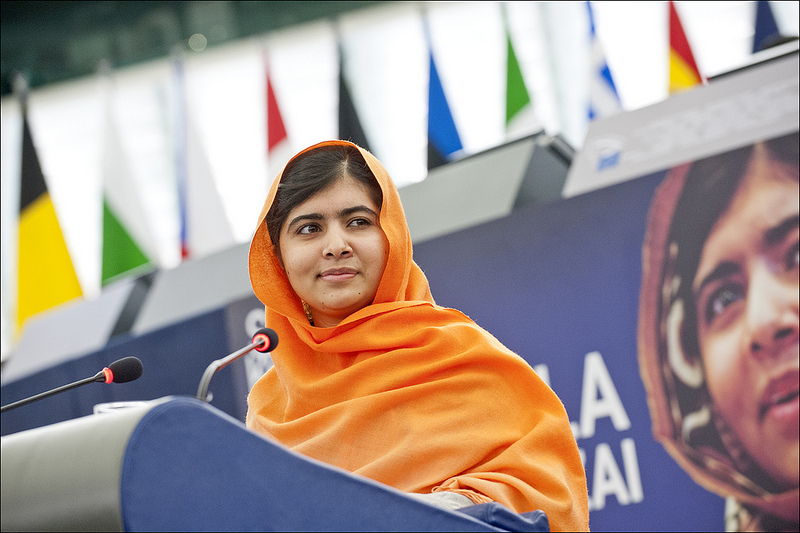Prize awarded for Freedom of Thought to a 16 year old Pakistani girl in dispute with the Taliban
“I dedicate it to the unsung heroes. We must fight for the survival of the weakest”
If there is a quote that has been abused to the extent of becoming empty of meaning by now, above all in Italy, it is certainly Voltaire’s words: “I don’t agree with what you have to say, but I will defend the right to say it until the death.” But these words, spoken by Malala Yousafzai at the award ceremony for the 2013 Sakharov Prize at the European Parliament, this young girl who miraculously escaped an assassination attempt by the Taliban who wanted to end her right to express her own ideas by killing her, have regained all their strength and depth in a heartbeat.
Awarding her the recognition for Freedom of Thought today in Strasbourg was President Martin Schulz, who defined the young Pakistani girl as a “survivor,” a “heroine,” an “extraordinary person for her endeavors to defend the right to education.” It was precisely because of her that in the Swat valley of Pakistan, fighting against the Taliban to allow girls to attend school, the Islamic Fundamentalists fired several gunshots at her in October 2012, hitting her in the face and neck. “I don’t want to be known as the girl the Taliban shot, but as the girl who fights for education. I want to dedicate my life to this.” However, she wrote in her book ‘I am Malala’ and now, according to Schulz “at just 16 years old she is the voice of millions of children and young people deprived of education,” and she reminds us of her pledge that “without education there is no hope for a better future. Without education there is no emancipation. Without education there is no freedom of thought.”
While receiving the Sakharov, standing in front of the plenary in Strasbourg, dressed in her traditional clothes with her head scarf, she began her speech with the words “in the name of God the merciful” and dedicated the award “to all the unsung heroes of Pakistan.” Malala said she was “honored” to receive the prize that in the past has been given to “Nelson Mandela, Aung San Suu Kyi and Kofi Annan.” In addressing the deputies always with the name “my dear brothers and sisters,” she spoke of the need for a “change of ideology,” a change that will help us understand that “a superpower is a country with skilled and educated people, not a country with armies and weapons.”
And with this in mind, in a world where 125 million children and adolescents, ¾ of whom are girls, don’t have access to education, for the young Malala we must “fight for the survival of the weak because if we leave people behind and in the outskirts of society, we will never succeed and will not survive even if we are the strongest.” For this we must continue to have “hope” and help these millions of children who “just want a pen and a book.”
Alfonso Bianchi

![Un motoscafo in Svezia. Nell'Ue si pone un problema di mancato riconoscimento delle patenti nautiche [foto:
Matti Blume, Wikipedia Commons. Copyright: Creative Commons Attribution-Share Alike]](https://www.eunews.it/wp-content/uploads/2024/11/motoscafo-Saltsjoen_Stockholm_P1090679-350x250.jpg)







![Un motoscafo in Svezia. Nell'Ue si pone un problema di mancato riconoscimento delle patenti nautiche [foto:
Matti Blume, Wikipedia Commons. Copyright: Creative Commons Attribution-Share Alike]](https://www.eunews.it/wp-content/uploads/2024/11/motoscafo-Saltsjoen_Stockholm_P1090679-120x86.jpg)
